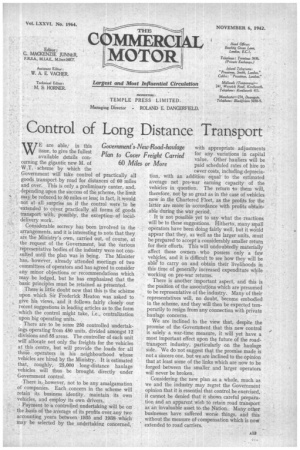Control of Long Distance Transport
Page 15

If you've noticed an error in this article please click here to report it so we can fix it.
WE are able; in this issue, to give the fullest available details concerning the gigantic new M. of W.T. scheme by which the Government will take control of practically all goods transport by road for distances of 60 miles and over. This is only a preliminary canter, and, depending upon the success of the scheme, the limit may be reduced to 50 miles or less; in fact, it would not at all surprise us if the control were to be extended to cover practically all forms of goods transport with, possibly, the exceptionof localdelivery work.
Considerable secrecy has been involved in the arrangements, and it is interesting to note that they are 'the Ministry's own, carried out, of course, at the request of the Government, but the irarious representative bodies of the industry were not con sulted until the plan was in being. The Minister has, however, already 'attended meetings of two committees of operators and has agreed to consider any minor objections or recommendations which may be lodged, but he has emphasized that the basic principles must be retained as presented.
There is little doubt now that this is the scheme upon which Sir Frederick Heaton was asked to give his views, and it follows fairly closely our recent suggestions in leading articles as to the form which the control might take, i.e., centralization upon big operating units.
, There are to be Some 250 controlled undertakings operating from 450 units, divided amongst 12 divisions and 55 areas. The controller of each unit will' allocate not only the freights for the vehicles at this centre, but will provide the loads for all tho-ge operators in his neighbourhood whose vehicles are hired by the Ministry. It is estimated that, roughly, 25,000 long-distance haulage vehicles will thus be brought. directly under Government control.
There is,-however, not to be any amalgamation of companies. Each concern in the scheme will retain its business identity, maintain its own vehicles, and employ its own drivers.
Payment to -a controlled undertaking will be on the basis of the average of its profits over any two accounting years between 1935 and 1938which' may be selected by the undertaking concerned, with appropriate adjustments for any variations in capital value. Other hauliers will be paid scheduled rates of hire to cover costs, including.depreciation, with an addition equal to the estimated average net pre-war earning capacity of the vehicles in question. The return to them will, therefore, not be so great as in the case of vehicles now in the Chartered Fleet, as the profits for the latter are more in accordance with profits obtainable during the war period.
It is not possible yet to say what the reactions will be to these suggestions. Hitherto, many srf all operators have been doing fairly well, but it would appear that they, as well as the larger units, must be prepared to accept a considerably smaller return for their efforts. This will undoubtedly materially affect those owners who possess only a few vehicles, and it is difficult to see how they will be able' to carry on and obtain their livelihoods in this time of generally increased expenditure while working on pre-war returns.
There is another important aspect, and this is the position of the associations which are presumed to be representative of the industry. Many of their representatives will, no doubt, become embodied in the scheme, and they will then be expected temporarily to resign from any connection with private haulage concerns.
We are' inclined to the view that, despite the promise of the Government that this new control is solely a war-time measure, it will yet have a most important effect upon the future of the roadtransport industry, particularly on the haulage side. We do not suggest that the promise made is not a sincere one, but we are inclined to the opinion that at least some of the links which are now to be forged between the smaller and larger operators will never be broken.
Considering the new plan as a whole, much as we and the industry may regret the Government opinion that it is essential that control be exercised, it cannot be denied that it shows careful preparation and an apparent wish to retain road transport as an invaluable asset to the Nation. Many other businesses have suffered worse things, and this without the measure of compensation which is now extended to road carriers.




















































